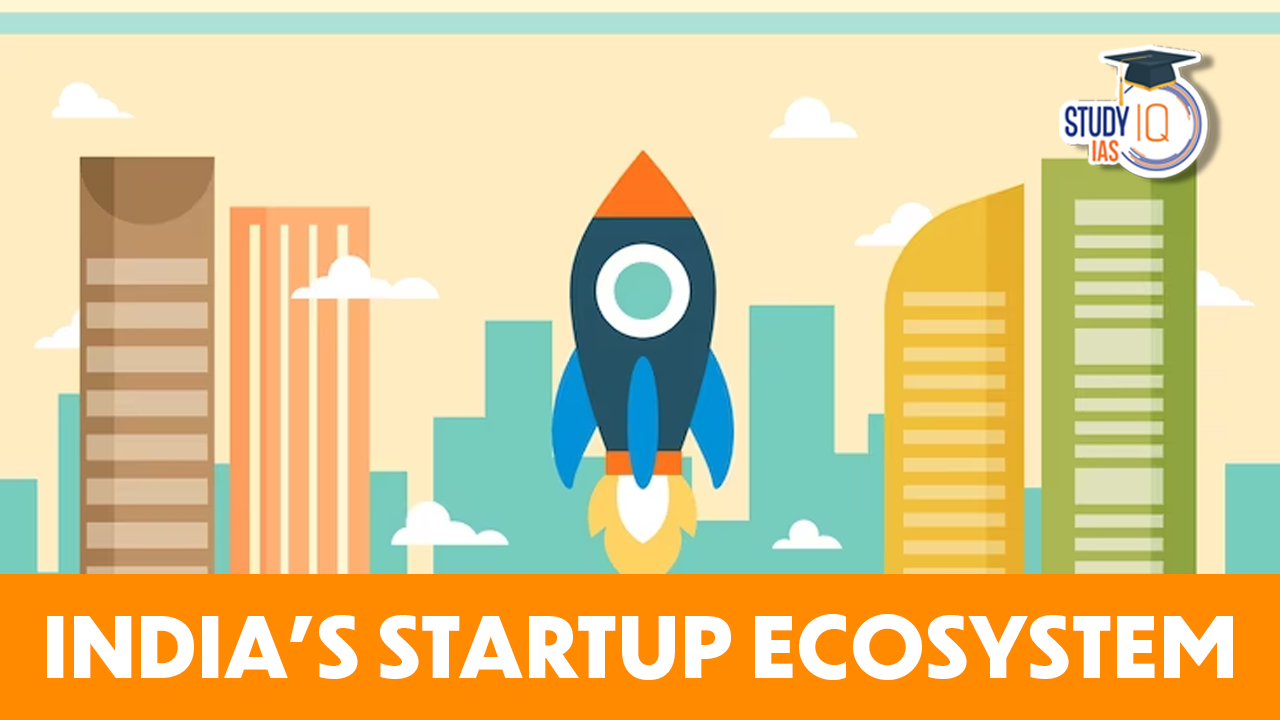Table of Contents
Context: The Union government asserted that it will always act as a facilitator to strengthen the start-up ecosystem in the country and not act as a regulator.
What are Startups?
- Startups are newly founded companies or businesses that are often characterized by their innovative ideas, scalable business models, and high growth potential.
- These ventures are typically established by entrepreneurs or small groups of individuals who aim to introduce a new product, service, or technology to the market.
Significance of Startups
- Employment Creation: Startups have the potential to generate a substantial number of jobs, often more than established companies. This is especially significant in developing nations like India, where high unemployment rates are prevalent.
- New Investments: Established companies often outsource certain tasks to startups, allowing them to focus on their core competencies. This opens up opportunities for investments into the country.
- Boost to the Economy: Startups not only create jobs but also stimulate economic activity. As they employ locals and purchase goods and services, money flows into the economy, leading to increased revenue for the government and overall economic growth.
- Fostering Entrepreneurship and Innovation: The startup ecosystem encourages entrepreneurship and fosters a culture of innovation, contributing to social capital and technological advancements, benefitting the whole economy.
What is a Unicorn?
- A unicorn is any privately owned firm with a market capitalization of more than $1 billion.
- Unicorns are developing innovative solutions and technologies and also generating large-scale employment.
- 1 out of every 10 unicorns globally have been born in India.
- Unicorns are active in Tier I cities. Bengaluru is India’s unicorn capital.
Startups in India
- The Indian startup ecosystem has evolved dynamically over the last two decades.
- Startups in India are emerging in the fields of IT, agriculture, aviation, education, energy, health and space sectors.
- Since the launch of Startup India initiative in 2016, DPIIT has recognised 92,683 entities as startups as on 28th February 2023.
- As per the Economic Survey 2021-22:
- India has become the third-largest startup ecosystem in the world after the US and China.
- Most of the startups are in the services sector and 49% of the startups are from tier-2 and tier-3 cities.
- A record 44 Indian startups achieved unicorn status in 2021, taking the overall tally of startup unicorns in India to 83.
- Some of the successful Indian unicorns are Lenskart, Cred, Meesho, PharmEasy, Licious, Grofers, etc.
Opportunities for Startups in India
- Scope in the Indian Market: India’s rapid economic growth and diverse population offer numerous opportunities for startups to cater to various needs and preferences of a large consumer base.
- Increased Political Will and Government Support: The Union and State Governments are increasingly recognizing startups as important engines for economic growth.
- Changing Perceptions towards Entrepreneurship: The rise of successful startup founders and their stories in the media has boosted the social acceptability of entrepreneurial careers, encouraging more individuals to pursue startup ventures.
- Geography of Startup Support: Most support is available in Indian metro cities with local peculiarities and unique ecosystems.
- For example, Bangalore developed as the startup hub as many engineering colleges and renowned academic institutes are located there. The ready-made talent pool provided a locational advantage.
Government Initiatives
Startup India Initiative: Startup India is a flagship initiative of the Union Government. It intends to catalyze startup culture and build a strong and inclusive ecosystem for innovation and entrepreneurship in India. Some of its Programs are:
- Fund of Funds for Startups (FFS) Scheme: The Union Government has established FFS with a corpus of Rs. 10,000 crores, to meet the funding needs of startups.
- Startup India Seed Fund Scheme: It aims to provide financial assistance to startups for proof of concept, prototype development, product trials, market entry and commercialization.
- International Market Access to Indian Startups: Startup India has launched bridges with over 15 countries that provide a soft-landing platform for startups from the partner nations and aid in promoting cross-collaboration.
- Startup India Hub: It is an online platform for all stakeholders of the entrepreneurial ecosystem in India to discover, connect and engage with each other.
- National Startup Awards: This program recognizes and rewards outstanding start-ups and ecosystem enablers contributing to economic dynamism by stimulating innovation and stimulating competition.
- Innovations for Defence Excellence (iDEX): It aims to boost innovation among the startups and encourage them to be a part of Indian defence and aerospace ecosystem.
- Atal Innovation Mission: Under this mission, the Union Government has set up Atal Incubation Centres (AIC) to incubate startups in various sectors.
- It has also launched Atal New India Challenge that aims to seek, select, support and nurture technology-based innovations.
Challenges to India’s Startup Ecosystem
- Lack of Funds: Funding is critical for startups to sustain. Shortage of capital can lead to cost-cutting measures with layoffs, mergers and consolidation and even complete shutdowns.
- The Indian startup ecosystem witnessed a 35% year-on-year fall in total funding till December 2022 with retail and fintech among the worst-affected sectors.
- Diversity and the Digital Divide: Indian customers are quite diverse, and the startups’ understanding of them is often limited to certain regions.
- Building up a pan-Indian startup is difficult because they have little understanding of customers in other regions.
- Low Willingness to Pay: It is hard for startups to generate a willingness to pay for their products and services.
- Despite increasing incomes, the Indian customer base continues to be price-sensitive and has little willingness to pay for products and services.
- Taking Products to Market: It is a challenge for startups to take their products to the market as Indian markets appear difficult to penetrate. This is due to:
- Competitive landscape: Many firms are already present and many more enter the market.
- Bureaucratic regulations: Big market players are more capable of dealing with bureaucratic regulations.
- Hiring Qualified Employees: For many job-seekers, joining a startup as an employee is not an attractive career option, due to the inherent risk that the startup might fail.
- Startups find a gap between the knowledge taught to students in colleges and the knowledge needed for the jobs, especially in technology driven sectors.
- Visa requirements make it difficult to hire employees from outside India and expatriates are more attracted to places like Singapore, where the living standard is higher.
- International Happenings: Issues like the Russian invasion of Ukraine, a spike in global inflation rates, and fears of a possible recession have also brought down the prospects for many startups in general.
Way Forward
- Policy reforms improving general economic conditions as well as investments in digital and physical infrastructure can benefit startups.
- Indian culture needs to be more encouraging towards people, who take agency and create something on their own. The willingness to take risks should be more appreciated and failure seen with less negative judgement.
- It shall be imperative to channel investments in education to develop a broader talent pool.
- Support must be extended to entrepreneurs in smaller tier 2, 3 and 4 cities.
- Fostering a good work culture can be helpful to attract and retain talent. This will foster a more inclusive and innovative environment.


 How African Reserves Eliminated Rhino Po...
How African Reserves Eliminated Rhino Po...
 Why India Needs Its Own Economic Model?
Why India Needs Its Own Economic Model?
 Challenges in India’s Airline Sector: ...
Challenges in India’s Airline Sector: ...

























